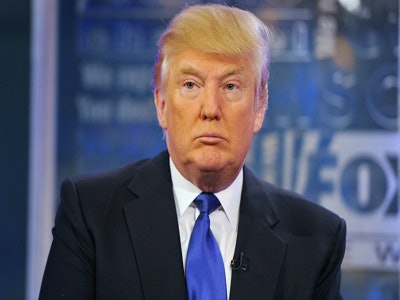Scores of presidents of public and private colleges across the nation have sent a letter to President-elect Donald Trump calling on him to “seek common ground, not hostility, partnership, not conflict” as he rises to the nation’s top leadership role amid a decline in civility.
 President-elect Donald Trump
President-elect Donald TrumpThe appeal comes after several weeks of widespread demonstrations protesting Trump’s election and mixed public responses to news reports of the names of some political and social figures Trump is said to be considering for keys roles in his presidential administration to begin in January 2017.
“As do you, we ‘seek common ground, not hostility, partnership, not conflict,’” said the letter to Trump from academic leaders. “In order to maintain the trust required for such productive engagement, it is essential that we immediately reaffirm the core values of our democratic nation: human decency, equal rights, freedom of expression, and freedom from discrimination,” the letter continued.
“As college and university presidents, we commit ourselves to promoting these values on our campuses and in our communities, and we stand alongside the business, nonprofit, religious, and civic leaders who are doing the same in organizations large and small,” the letter continued.
“In light of your pledge to be ‘President for all Americans,’ we urge you to condemn and work to prevent the harassment, hate, and acts of violence that are being perpetrated across our nation, sometimes in your name which is now synonymous with our nation’s highest office,” the presidents said. “In our schools, on job sites and college campuses, on public streets and in coffee shops, members of our communities, our children, our families, our neighbors, our students, and our employees are facing very real threats, and are frightened,” the appeal said.
“One of the roles of leaders is to protect and empower the most vulnerable. As President-elect, this responsibility rests heavily on you. Let this be a mark of your leadership,” the higher education chief executives said.
The letter was signed by a wide range of university chief executives from Elizabeth Davis, president of Furman University, the private Southern liberal arts institution, to Scott Bierman, president of Beloit College, the private Midwestern university, to Dr. Frank G. Pogue Jr., interim president of Cheney University of Pennsylvania, to Mark McCoy, president of DePauw University, the prestigious, private liberal arts institution in Indiana and Lisa A. Rossbacher, president of Humbolt State University, one of the California State University four-year institutions.
University presidents across the nation are concerned about the tone of public discourse following the outcome of the election and the urgent need for public figures, starting with Trump, to bring civility to the discussions, said Pogue, who has focused on civil discourse for several decades, echoing the sentiments of others.
“You’ve got to talk about civility more now than ever,” said Pogue, reflecting on the disrespectful political exchanges of candidates this year and the disruptive behavior against fellow citizens encouraged by some during the campaign. “We are nowhere near a civil community now. … We are really in a hostile environment.”
Pogue said he has written a separate letter to the Cheney community urging it to embrace civility, regardless of how they feel about the outcome of the election. He said presidents of Pennsylvania’s other state colleges have done the same in their respective communities.
As the higher education leaders made their appeal to Trump, Robert Dilenschneider, one of the nation’s top corporate public relations consultants and a long-time public advocate of civil discourse, said in Tuesday’s telephone interview that he too feels those who feel they can help restore civil discourse should do so. He said the election campaigns this year signaled “most of the leadership in America is out of touch with most of the country.”
Still, Dilenschneider says, the unhappiness with the nation’s leaders did not warrant the demise in civil dialogue. Dilenschneider, who represents clients in nations around the world, said he is sending a letter to more than 2,000 of his VIP letter recipients calling their attention to the risks of the unwieldy discourse in America and offering some guidance and advice to the audience of decision makers.
In 2010, the Dilenschneider Group and the Carnegie Council published “A Return to Civility,” an essay written by the Rev. Theodore Hesburgh, President Emeritus of the University of Notre Dame, in conjunction with a 2011 program they were conducting on “the importance of decency and civility in society.”
On college and university campuses across the nation, rank-and-file academicians and even public affairs officials have weighed in to encourage people to calm themselves.
European history professor Dr. Roshunda Belton at Grambling State University echoed many academics in seeking to put the election outcome in context.
“With this election, regardless of who would have won, there would have been protests,” said Belton, noting that voter and public sentiment had been polarized long before election day. Since the election, Trump “has not done” some of what he could to calm the public over its fears and concerns, she notes, in comparing some of the pro-Trump rhetoric to “extremists” of past eras.
“This 21st century (election) is reaction to diversity, the progress, becoming more global,” said Belton, adding that “the world is advancing more than some segments of society.” She explained that those who feel left behind by the changes of the past few decades voted to regain what they had lost.
Belton said the campaign rhetoric and promises from Trump are going to hit a reality all leaders face at some point. A lot of things that spurred people to vote for Trump are not going to happen, Belton said, based on history.
“Retooling has taken place,” Belton said.
“Trump has already softened his stance” on some issues, she notes. “We will see in four years how his base reacts.”





















